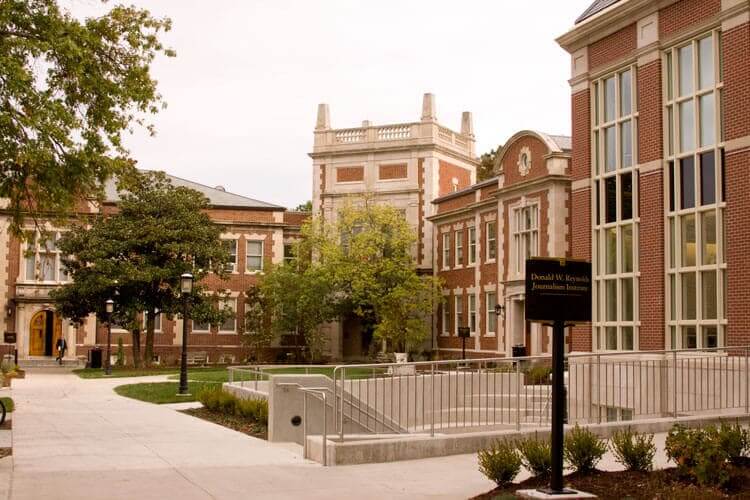Get the latest ranking of The Top 10 Journalism Schools 2019 here.
Do you dream of a front-page byline? Pick the right journalism school and you’re on your way. Maybe you want to produce for CNN. With premium connections to internships, you’ll be one step closer to your dream. The country’s best J-schools ultimately shape students into top-notch journalists, editors, producers, anchors, Emmy winners and foreign correspondents with a passion for tracking down the truth. These 10 journalism schools offer prestigious student publications, Pulitzer-worthy faculty and connections to brag-worthy internships that will set you on the right track to the New York Times.
Want your byline on the New York Times? Check out the best journalism schools in the country.
10. Arizona State University

¿Quieres ser periodista? ASU’s Walter Cronkite School of Journalism and Mass Communications allows students to follow their passion however they choose, with focuses in digital media, broadcast news, reporting, public relations and Spanish-language reporting. Within these specialized areas, ASU directs students towards real-world experiences through internships at CBS Radio, Fox Sports and Vogue Magazine. “It’s a university filled with instructors and students who really care about issues. They’re really interested in public service,” graduate student Elizabeth Blackburn said. “When I look back at my education at ASU I remember those people who truly want to serve—that is what ASU does.” The school also trains award-winning journalists like Hearst Journalism Award winner Megan Thompson. Don’t you want to be recognized at the national level? Your first steps through the doors of ASU’s J-school could lead you to the spotlight.
9. American University
American University’s J-school takes students back to the building blocks of journalism, laying a foundation as a springboard for success. From the main newspaper, The Eagle, to ATV and American Literary Magazine, AU lets you choose how to bring your stories to life like their very own 2016 Hearst award winner Cuneyt Dil. The program owes its successful students to the faculty. “Classes at AU are small. You really get to know the professors. You really get to know your classmates,” senior Emilie Ikeda said. “The connections people make [are really important]. Even if they’re not in your field, they know someone. The alumni are willing to connect.” Be prepared to capture distant cultures and beautiful landscapes for spreads in National Geographic, or to expose the seedy underbelly of the political sphere with The Washington Post with both publications headquartered only a metro ride away.
8. University of Southern California

Interested in political news? USC’s Fox News internship could turn you into the next Megyn Kelly. The Annenberg School of Journalism at USC brings technology to the table with a new media center featuring top of the line digital video studios and editing suites. With groundbreaking classes like, “Hands on Disruption: Experimenting with Emerging Tech,” USC gets you involved with all of the up-and-coming technologies in the journalism world, from virtual reality tech to wearable drones. USC’s newspaper, The Daily Trojan, consistently churns out groundbreaking stories, making it the main source of news for USC students since 1912. This J-school’s students also won an astonishing 30 LA Press Club Awards in 2015. “There’s a lot of opportunities here if people want to reach out and grab them,” grad student Monica Castillo said. “They’re always bringing really interesting speakers [to the school], so as a student you have access to Gloria Steinem, Bill T. Jones and Arianna Huffington.” It’s probably safe to attribute their success to the amazing internships the schools offers. Looking to build up that resume? Don’t sweat it. Take on the crime beat with an internship at The LA Times.
7. New York University

NYU sits in the very heart of the news world. The Arthur L. Carter Journalism Institute offers its students a journalistic education with a conscience. In addition to training in skill-based disciplines like reporting, NYU places emphasis on ethics with classes such as the politics of media work and the role of the journalist in society. With 15 student publications, prospective Bobcats take can part in print, broadcast news, radio or a wide selection of campus magazines. “I really have to give big kudos to the NYU career services staff,” junior Felipe De La Hoz said. “They don’t just do their jobs, they really go above and beyond. They really make sure students are aware and take advantage of opportunities—they know each student’s individual focus.” Immerse yourself in journalistic experience with some of the most prestigious publications in the world, interning through NYU with The New York Times, Rolling Stone, New York Magazine and Esquire.
6. Boston University

Journalists dream of writing a tell-all that exposes a government scandal. Or how about a heartwarming feature of heroic triumphs? Graduates from BU’s School of Communications followed this dream in droves, giving the school bragging rights for its 24 Pulitzer Prize winning alumni. Attend school in the shadow of alum Don Van Natta, Jr., a two-time Pulitzer winner whose most recent prize saw him recognized for his work on Al Qaeda following the September 11 attacks. BU students to take part in everything from the school paper, The Daily Free Press, to a host of student magazines and online publications, totaling 15 publication opportunities. With distinguished professors such as Michelle Johnson, former editor of The Boston Globe, BU allows you to hear real stories about the life of a journalist from those who’ve lived it. Dreaming of titanic financial success? Taking over Wall Street might lay just a few steps beyond BU’s internship with The Wall Street Journal.
5. Syracuse University

The Newhouse School’s faculty will teach you to dig for the dirt with a keen eye and honed skills. You could learn from Assistant Research Professor David Burnham, who was inducted into the National Freedom Act Hall of Fame in 2006, or Professor and Associate Dean Joel Kaplan whose investigative reporting for The Chicago Tribune made him a finalist for the Pulitzer in 1986. In 2014 alone Syracuse’s students won four Hearst Journalism Awards, 11 Society of Professional Journalists Awards and two Associated Press Pacemaker Awards (one for the main newspaper on campus, The Daily Orange). The program won big again in 2015 with another three Hearst Awards. Win big outside of the college too by interning with the likes of The New York Daily News, a position that’ll leave you primed for your future front-page debut.
4. University of North Carolina, Chapel Hill

UNC Chapel Hill defies the cookie cutter mold of most journalism programs with unique areas of focus. Students can specialize in reporting, photojournalism, broadcast and electronic journalism, advertising, business journalism or public relations. With a student to faculty ratio of 13:1, students get well acquainted with experienced professors in their area of focus. In 2014, UNC held the Edward R. Murrow Program for Journalists, a program that brings journalists from around the world to continue the protection of free expression. UNC’s dedication to global journalism allows students to embrace perspectives from not just the United States, but also around the world. “It opens a lot of doors because people know the name [UNC] and they perceive us as the cream of the crop. We come out really prepared for our industry – whether that’s journalism or something else,” senior Malia Brown said. “We get a real taste of the world before we step into it.”
3. University of Missouri, Columbia

Founded in 1908, Mizzou holds its claim to fame as the world’s first journalism school, and they’ve turned out world-class journalists ever since. Students choose from six areas of focus: convergence journalism, magazine journalism, photojournalism, print and digital news, radio-television journalism and strategic communications. Within those specializations, students focus even more intently on subjects like entrepreneurial journalism. Shoot for that front-page photo credit and soak up the knowledge of professor and Pulitzer winner Jacqui Banaszynski, who won for her series “AIDS in the Heartland.” “Missouri is the best because of the hands-on learning experience you have at this school; and because of the faculty we have here, the opportunities are enormous,” senior Anne Marie Hankins said. “My teacher Kevin Drew put me in contact with a writer at The New York Times when they were working on a story about a piece of artwork at the Missouri capital, so through a teacher I was able to be published in The New York Times.” Take up the Mizzou legacy and learn from the best at our oldest J-school.
2. Northwestern University

What would you give to pick the brain of an experienced journalist with a lifetime of accolades under her belt? Northwestern provides the chance for students to experience these intimate moments with classes averaging seven students to a professor. Classes give aspiring journalists the chance to work closely with professionals like Emmy award winner and former broadcast journalist Beth Bennet. “You’re taking classes with really cool professors who have a lot of experience and students who are really talented,” sophomore Amal Ahmed said. “These are kids who you know are going to do really awesome things in their future so it’s really cool to be working with them here and now.” What really sets this program apart, however, is its mandatory journalism residency. The program matches students to a media outlet in the U.S. or abroad for a whole academic quarter, allowing them to work full-time and get real hands-on experience. Whether you’re philosophizing on viral media with Facebook, working on the coveted swimsuit issue of Sports Illustrated or pairing up with one of the school’s 100 other media partners, the experience holds no equal.
1. Emerson College

So you want to broadcast live from the red carpet at the Emmys? Well, Emerson College can make it happen. From its radio station WERS-FM to Ploughshares, a nationally regarded literary journal, to The Berkeley Beacon, the student newspaper, Emerson seeps journalism into students’ lives daily. Alumni also work to connect current students with internships and opportunities like live broadcasting from the Oscars. “We call it the Emerson mafia,” said alumna Jillian Leff. “Everyone knows about it but nobody talks about it.” Emerson prides itself on its remarkable faculty like Emmy-award winning anchor Carole Simpson. Associate Professor Paul Niwa launched international TV networks and newscasts, and Professor Janet Kolodzy held the position of senior writer/editor at CNN International. With these great minds at the helm of the program, Emerson shapes the great journalists of tomorrow.
What It’s Really Like to Go to the One of the Best Journalism Schools in the Nation
1. You’ll start to feel the heat.
“Emerson is really competitive and all the journalism students are really smart so everyone gets to learn from their peers and improve to become better journalists.… Classes are very challenging because we strive to stay as the number 1 school in journalism. To be honest I chose to go to Emerson because I wanted to challenge myself. Emerson is one of the top journalism schools and I thought I could learn a lot from the experience to become a better writer and journalist.” – Reilley Djou, Emerson College, sophomore
2. You’ll get one-of-a-kind opportunities.
“One particular class that I adore is actually a set of 2 classes. The first, Latino and border issues, is a lecture. The second, which you have to be invited to by the professor of the first, is in depth reporting where the school flies students to a different country each year over spring break to report on an in depth story of your choosing that has to do with the people in that country.” – Rachel Banks, Arizona State University, senior
3. You’ll write about stuff that actually interests you.
“Classes definitely vary from professor to professor in how they are structured but what doesn’t change is the creative freedom they allow their students. As someone who is aspiring to be a sports journalist, I’m giving free range to pursue the sports stories that interest me. That is so important as I never feel disengaged from classes since I know I’ll be allowed to use the journalism skills I’m learning to report on things that interest me.” – Jack Aylmer, Emerson College, sophomore
4. You’ll find an open door at every knock.
“There’s such an amazing network of Emerson alumni that work at publications and news stations across the country, and dropping the name Emerson can get you into so many doors and give you so many opportunities…All of the classes I had were engaging and challenging and definitely prepared me for a career as a journalist, especially as a freelance one.” Jacqueline Weiss, Emerson College, recent graduate
5. You’ll get that name recognition.
“There is something that we refer to as the “Mizzou Mafia”, and it’s basically a term that refers to the fact that Mizzou grads hire Mizzou grads, and you can find a Mizzou grad in every major news outlet in the country…. I am currently in Hong Kong, working as an intern at McCann-Erickson and I have already met people who have either studied at the Mizzou journalism school or have been to Mizzou for various conferences and visits.” – Elin Enrooth, University of Missouri, senior
6. You’ll learn from professionals who actually want to help.
“I’ve absolutely loved my time at Emerson so far. The journalism professors are all very distinguished members of the industry, but more importantly are more than willing to work with you one-on-one to help you improve.” – Aylmer
7. You’ll feel supported and respected by the journalism community.
“Not only does attending BU mean there are multiple papers and tons of respect for journalists, but the community as a whole supports and regards our writing. Each student is emailed every single day with three/four articles from one of the papers. Also, if you don’t know someone who writes for FreeP (Daily Free Press), Tab (TheTab) or Odyssey (The Odyssey) then do you even go to BU?” – Sabrina Schnur, Boston University, sophomore
8. You’ll learn if a journalist’s life is really for you.
“You will leave a class either completely confident this is what you want to do forever and you have gained valuable life skills on how to do it from experienced professionals (our professors certainly have amazing resumes of past experience); or over-stressed and decide to switch fields. This is such an important thing to learn while in college instead of once you have a job doing it.” – Schnur
9. You’ll actually feel prepared to enter the journalism industry.
“Our classes are very hands-on, which I have found pretty difficult yet very helpful for the future! This we call the ‘Missouri Method’ and it describes the hands-on approach the journalism school takes toward the learning process. Through internships and other experiences where I have been able to work with journalism students from other universities, I have been amazed at how in-depth my education has proven to be. I actually feel that I am prepared for work after graduation, and I am confident in my skills.” – Enrooth
10. You’ll learn that upholding journalistic integrity is always #relevant.
“Most schools regard journalism as a dying art that requires a focus solely in visual media (aka- ‘yes we have journalism but anyway we have film, tv’). BU incorporates a whole major called emerging media, but will never lose its literal journalistic integrity.” – Schnur
5 items every aspiring journalist needs


2. Notebook


3. NY Times Student Subscription

4. A laptop


5. Smart phone


Not sure what to major in? Check out different journalism concentrations to narrow your focus.
Print Journalism: Whoever said print journalism was going out of style was so wrong. Newspapers and magazines still end up on people’s doorsteps—just make sure to learn how to incorporate various media components to the online version of articles.
Broadcast Journalism: Whether you want to stand in front of the camera or act as the mastermind behind it, this major is for you.
Photo Journalism: Learn to tell a story through a lens with the photojournalism major. You want the picture to speak thousands of words—that way you don’t have to.
Media Studies: Get to know the media so you can master it.
Bring your love for words to life with the writer collection:

Updated July 14, 2016: An internship program with The New Yorker previously referenced in the section describing New York University has been changed. This internship program has been cancelled by Condé Nast, the media company responsible for The New Yorker. The article has been altered to include an internship at New York Magazine available to NYU journalism students.
Updated August 1, 2016: We added awesome dorm products and links to get them fast.
Updated June 30, 2017 by Celina Pelaez to include sections”What It’s Really Like to Go to the One of the Best Journalism Schools in the Nation,” “5 Items Every Aspiring Journalist Needs” and “Journalism Concentrations,” plus literary dorm accessories.



















